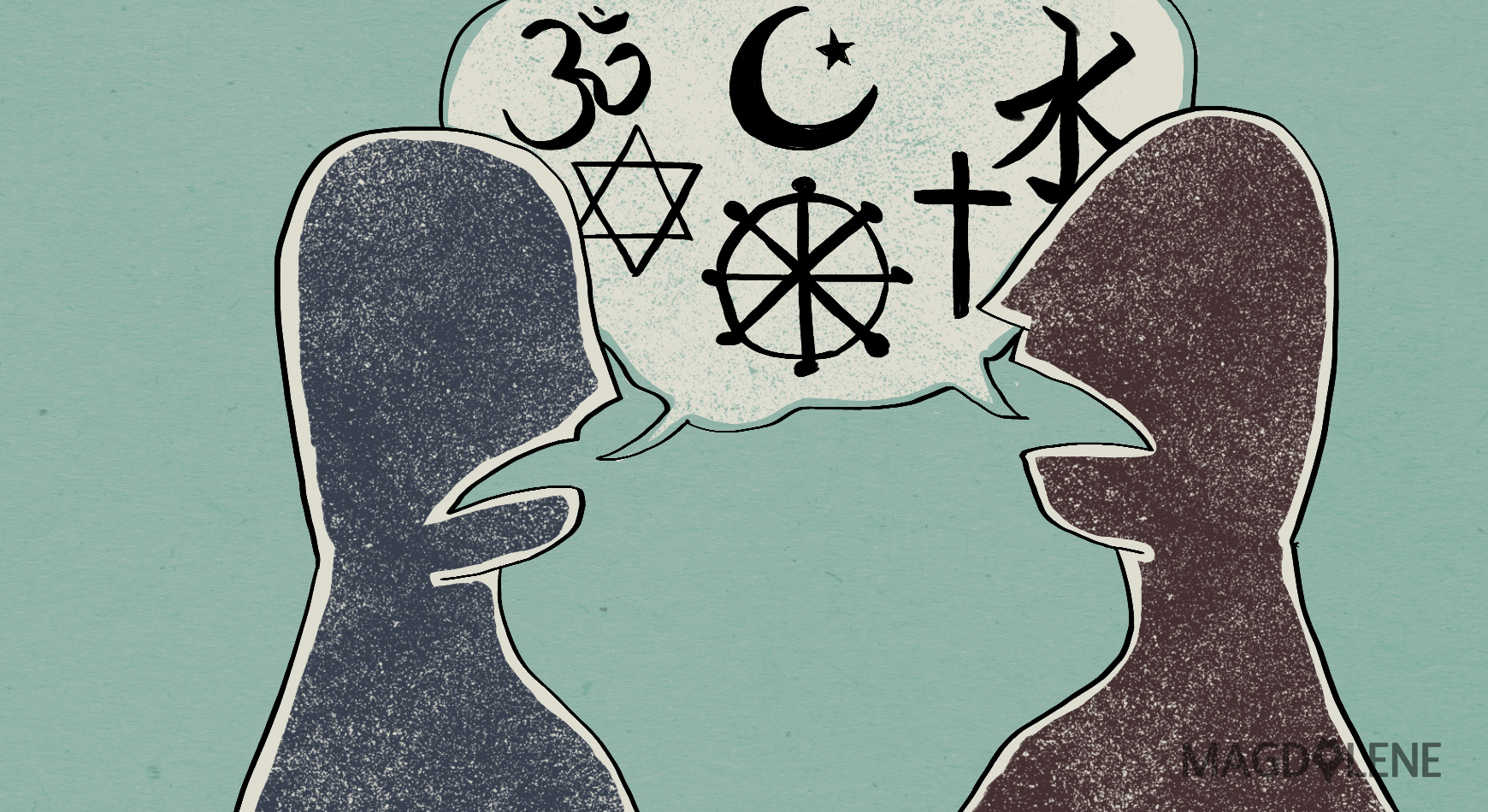“Don’t bring up religion. It’s a sensitive topic.”
“Religion’s too personal. I don’t want to make anyone mad.”
“Let’s avoid religious topics. People will just end up fighting.”
This probably sounds familiar to most of you. Rule of thumb for a smooth-going, friendly conversation: No talk of religion. At all costs. And if you’ve tried to bring it up, you’ve probably been shushed by your mothers, or had your shins kicked under the table by friends.
On the outset, it’s easy to see why. Religion has been the root cause of many, many disagreements since, well, the concept of religion began. From heated arguments between family members, to outright war and genocide between whole peoples, a lot of hurt has gone down in the name of faith. Check today’s headlines and there’s sure to be horrible news brought about by religion, be it the Israeli-Palestinian conflict, or women dying from illegal abortions because they were denied birth control.
It’s a tricky topic, no doubt about it. Some people believe deeply in one thing, and other people believe in something else completely, including things directly opposed to what other people embrace. And because of this near-certainty that there will be opposing views should religion be brought up, it’s just so much easier to steer clear away from it and talk about less personal, more agreeable things.
But is walking on eggshells around religion really the best way to go? Is giving everybody miles and miles of personal space when it comes to religion what will truly ensure that we all peacefully co-exist despite differing beliefs? Can we achieve world peace through…squeamishness?
I say no. In fact, this unspoken rule to leave religious opinions, well, unspoken, may just be the reason people of differing faiths are at each other’s throats all the time.
Insta-censorship
Merely saying, “Let’s talk about religion," for example, is enough to make people put their defenses up. You haven’t even gone into depth about your opinions—or even start the conversation, for the matter—and already people find it a problem. Do you see how that in itself is problematic? Isn’t it troubling that imposing censorship in such a simple situation is so immediate, brash, automatic?
Can’t people see that the main reason religion is a “sensitive topic” is because they’re so adamant at labeling it a sensitive topic in the first place? People are so obsessed with preempting any chance for discomfort that they’re causing the discomfort itself.
When you insist that something causes discomfort, even before that thing actually does anything, it can lead people to fear it irrationally. They haven’t even encountered the topic first-hand, haven’t gotten to learn anything about it at all, and they are already frightened by it. And because people are so frightened by it, they are in turn distrustful of it.
What happens when people fear and distrust something they didn’t (or weren’t allowed to) understand? A lot of unwarranted, grossly misplaced anger. Fighting between families. Fighting between countries. Whole lifetimes of conflict and chaos.
Decency in dialogue
Some may try to play the devil’s advocate and say, “Okay, so let’s say we started talking. Won’t people just keep insulting each other? Won’t they just hurt each others’ feelings? Is that really what you want?”
Again, no. We have to stop immediately assuming that any conversation about religion goes through a funnel of malice and resentment. Believe it or not, but two people of differing faiths can talk about what they believe in in a calm and respectful manner. It’s all just a matter of wanting and trying your best to be calm and respectful.
This actually reminds me a lot of slut-shaming. If you wear a short skirt, does that mean you were asking to be raped? No. And if you see someone wearing a short skirt, are you automatically compelled to rape that person? No.
Likewise, if you bring up the topic of religion, does that mean you were asking for a fight? No. And if someone broaches the topic of religion to you, are you automatically compelled to see that person as the enemy? No.
The key behind both situations is choice. We can choose to be calm, rational adults and discuss the things we strongly, deeply believe in without getting mad at opposing opinions, or we can be childish and insecure about it. It’s really the same rules you would apply to any decent conversation about any other topic, for that matter.
Use clean, straightforward language. If you want to criticize, be constructive about it. If you are the one being criticized, take the critique graciously. It is, after all, up to you whether to use the comments or not. You do not become a lesser person in any way just because someone doesn’t agree with you.
Pride and prejudice
And what if the person you’re talking to becomes greatly insulted and incensed by your (calmly delivered, constructive) opinions? What if they invoke the idea that their faith is something incredibly, incredibly important to them, and that your (rational, malice-free) words hurt the very core of their being? Frankly, that’s already their problem.
You weren’t trying to hurt them, or assert that they were inferior to you. You were trying your best to hold a decent conversation between two grown adults. Besides, if that person was really, truly, solidly dedicated to their beliefs, should they really be so distraught over a mere exchange of words? If their faith is so unshakeable, then why are they so shaken over a person talking to them normally?
If you think about it, the people who are being truly insensitive are the ones who refuse to acknowledge the differences between everybody’s beliefs, who refuse to admit that every person is an independent individual with their own values and opinions.
What’s truly insensitive is going out of your way to ignore the beliefs that matter so much to someone just because you don’t agree with them.
So yes, by all means, we need to talk about religion. I just did. Now you.
Marguerite de Leon is a social media producer for Rappler. She received the Mulry Award for Literary Excellence upon graduating from the Ateneo de Manila University in 2007. She writes fiction, and her short stories have seen print in various national publications.
This story was first published in Rappler.com, a Manila-based social news network where stories inspire community engagement and digitally fuelled actions for social change.








Comments